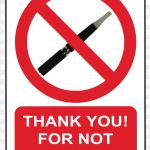{"preview_thumbnail":"/sites/default/files/styles/video_embed_wysiwyg_preview/public/video_thumbnails/OISQSjgXgEA.jpg?itok=IUiuLS3K","video_url":"https://www.youtube.com/watch?v=OISQSjgXgEA
smoking
Join Cameron English and Dr. Chuck Dinerstein on Episode 127 of the Science Dispatch podcast as they discuss:
The pile of studies confirming that nicotine vaping is an effective quit-smoking tool continues to grow.
Over the course of my career as a science journalist I’ve learned an important but disheartening lesson: experts are allowed to mislead the public about certain health topics. One of the most egregious cases is nicotine vaping.
Join Cameron English and Dr. Chuck Dinerstein on Episode 86 of the Science Dispatch podcast as they discuss:
As a surgeon, writer, and amateur woodworker, I have had many opportunities to use my head, heart, and hands, which are the basis for much of my creation. Then I ran across this.
Anti-smoking groups had a serious problem on their hands.
If you need further evidence that the tobacco-control movement has lost its way, consider this December 1 story from
For many years, the science communication landscape looked something like this: reputable universities and public health institutions did sound research and educated consumers about the risks they faced; devious activist groups fabricated health s
More good news from the world of public health: teen vaping continues its steady decline, according to the latest results from the CDC's National Youth Tobacco












